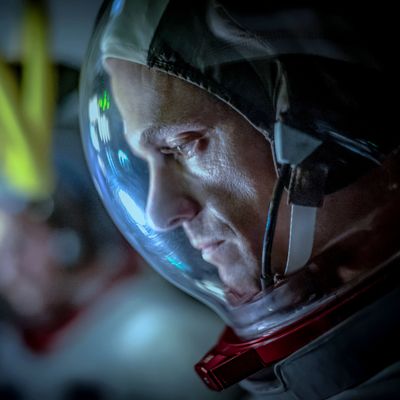
I spent most of the first six episodes of For All Mankind arguing with myself. Was I truly enjoying the new Apple TV+ series from Ronald D. Moore (of Outlander and Battlestar Galactica) about a timeline where the Russians beat the U.S. to the moon? Or was it just close enough to a thing I so badly wanted to enjoy that I could squinch up my eyes and pretend that’s what I was seeing?
For All Mankind’s alternate-history premise is enough to perk my interest, but there’s an important additional layer at play here: In this vision of the space race, Russia also sends a woman to land on the moon, spurring NASA to invest heavily in a program to train women astronauts. In the best possible version of For All Mankind, the show is something like A League of Their Own But Make It Space. That’s the show it should be.
This additional layer is where most of my questions about For All Mankind lie. With a premise as good as “an alternate history where women go to space,” why bury that development until episode three? Is the show really going to be about the women, or will that be just one small piece in an increasingly weird, divergent timeline? (Six episodes in, I still have no idea what the answer to this will be.) With an actress as good and convincing as Sonya Walger playing astronaut Molly Cobb, why doesn’t For All Mankind spend more time with her, instead of devoting the majority of its many (many many) minutes to the drama of the male astronauts who resent her presence?
There is also, for no reason I can yet figure out, a running side plot about a young Latina girl (Olivia Trujillo) who immigrates to the United States with her father and idolizes the women astronauts. Her presence could feel pretty radical; not many series would think to tell a story about a young immigrant girl while also reimagining the history of American womanhood. Instead, she is almost entirely uncharacterized, possessing about the same level of personhood as a single sentence in a speech about being an inspiration to little girls. Why is she even there? Is she for anything, other than to remind us all that if someone is inspiring, someone else must necessarily be inspired?
So I watched the first episode again, hoping to understand more about what For All Mankind is going for. I also watched it again because it was honestly a little hard to get a sense of the series via the buggy, heavily watermarked Apple TV+ screener. For All Mankind is an expensive, lushly detailed series — its insides may be jumbled and too long, but its surfaces are full-on space-epic lovely, with no expense spared on the glorious spacecraft imagery or on the details of costumes, sets, or settings. Watching it the same way you might watch a movie illegally downloaded from a high-quality torrent site in 2013 just did not feel right.
Sadly, on my second time through, For All Mankind did not reveal any Rosetta stone of internal design that I’d missed the first time, nor did I ever adjust to the watermarks. It only got more frustrating that I still couldn’t quite see it as the show I most wanted it to be — a daring, swashbuckling, women-centric story about the space race, full of guts and humor and camaraderie and mistakes and victories.
There are pieces of that show there, moments where For All Mankind lives up to the show it could be. And it could still become that show; even in the moments where I found myself annoyed by the lack of snap and fizz, I was still curious about where it was going. Its small tastes of an alternate timeline are intriguing, and a thoughtfully unfurled history where America has a moon base might be truly fun to watch — or it could continue to plod along slowly, rendering what should be thrilling developments into rote, textbook-like accomplishments. I’d have hoped that six full hours of the series would be enough to make me sure about what the show is going to be, but here I am, still arguing with myself.


